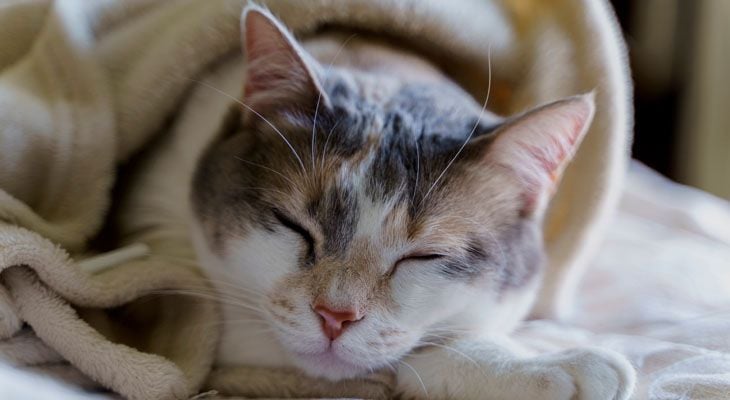Respiratory Issues
- Created in Feline, Pet Health, Chronic Conditions

As with people, cats’ lungs allow them to breathe and transfer oxygen from the breath into the blood. Unfortunately, many things go wrong with their little lungs, making feline respiratory issues common. Here are a few things to look out for that could signal that your cat is suffering from a respiratory condition as well as some common respiratory disorders.
General Symptoms
How do you know if your cat is experiencing respiratory problems? These are some common signs of a respiratory issue:
- Sneezing and wheezing
- Labored breathing
- Pale blue gums, lips and nose
- Fainting
- Lethargy
- Irregular heartbeat
- Loss of appetite
Dyspnea
Dyspnea is a symptom; it is not a disease in itself. It describes shortness of breath. If your feline veterinarian says your cat has dyspnea, it means he or she has significant difficulty inhaling and exhaling. You might notice noisy panting, coughing and gagging. Your vet will help you identify the cause of this symptom, so you can treat it.
Upper Respiratory Infection (URI)
Usually, an upper respiratory infection mainly involves the nose and throat. If your cat has a URI, you will notice sneezing, swelling around the eyelids and discharge from the eyes and nose.
Bacterial or viral agents typically cause URIs. These infections are very contagious. Infected cats shed particles through nasal and eye secretions and through their saliva. Since the virus cannot live for very long outside a body, most cats pick up a URI from direct contact with an infected cat.
Treatment strategies often involve topical eye medication, antibacterial drugs and steamy sojourns in the bathroom with a humidifier. Nasal congestion usually leads to decreased appetite. Your veterinarian may suggest some extra-tempting canned food to coax your cat into eating.
A more severe URI might necessitate a stay in the veterinary hospital, especially if your cat is extremely dehydrated.
Bronchitis and Asthma
Although bronchitis and asthma originate in the airways rather than in the lungs, they are still considered lung diseases. If your cat suffers from one of these conditions, a combination of excess mucus and muscle spasms will restrict airflow to the lungs. Overreaction to allergens, such as smoke, pollen, dust, bacteria or parasites, can cause these frightening manifestations. Your vet may order steroids to relieve your cat’s asthma.
Pneumonia
Pneumonia has many causes, including viral, fungal and bacterial sources or the ingestion of a foreign substance. However your cat gets it, he or she will suffer from inflamed lungs and airways, causing discomfort and difficulty breathing. Treatment usually involves a dry and warm environment, antibiotics, additional medications and/or oxygen therapy.
Pleural Effusion
Diseases such as cancer or kidney disease, traumatic injury or heart failure can all lead to pleural effusion. This condition is characterized by fluid buildup in the pleural cavity, the space between your cat’s lungs and chest cavity. Many feline lung diseases also lead to pleural effusion, including lymphoma, feline infectious peritonitis and the bacterial infection called Pyothorax. If your vet suspects your cat has pleural effusion, he or she will probably want to drain fluid from your cat’s chest.
Diagnosis and Treatment
If you bring a cat that’s in respiratory distress to a veterinary hospital, the emergency personnel will treat the cat’s breathing first and diagnose the underlying cause later. Treatment might start with putting the cat on oxygen and administering sedatives to lessen stress. The staff may need to let the cat calm down before they can even touch him or her. Once the cat’s condition has stabilized, the vet can then take X-rays, do a blood test and perform a fecal examination to ascertain the source of the cat’s breathing trouble.
Are you worried about your cat’s respiratory health? Call us immediately, so we can help.


